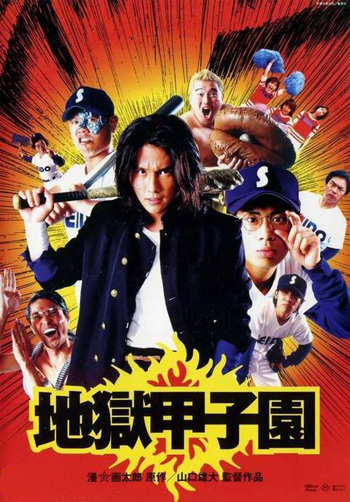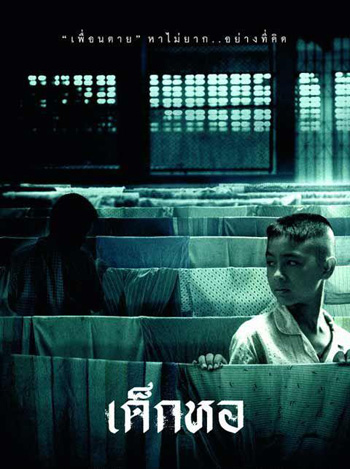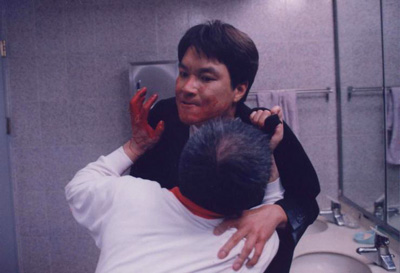Contrary to appearances, I have not been neglecting this blog. I have, in fact, been screening films to write about, but they've all been too sucky or non-shocking to qualify. But then I thought, "Hello, why not write about them anyway?" As Groucho Marx once remarked after a particularly crap joke, "They can't all be good, you've got to expect that." You said it, Groucho!

The lamest of the lot by far was
Battlefield Baseball (2003). I'd wanted to see this one for years, having heard it was similar to
Shaolin Soccer (only with Japanese zombies instead of Chinese martial artists and baseball instead of soccer). Plus Tak Sakaguchi is in it, and I thought he was great in
Versus. Imagine my disappointment, then, when I discovered it was utter dogshit. Seriously, I'm willing to forgive a lot in terms of outrageous, manga-esque excess (see my
Asia Shock for ample proof), but this film didn't even deliver on the promise of its own outrageousness.
The premise, wafer-thin as it is, is this: A high school principal fears for his prize baseball team when he realizes they're slated to play another team known for mutilating and murdering their opponents on the field. That's it, that's the whole movie. Apparently, the film's budget did not allow for special effects, as all such mayhem happens off screen, leaving us to view a baseball field strewn with cheap-looking body part props. To keep things going, people come back to life, only do the same schtick all over again. Ugh.

Then I watched
Dorm, (2006) supposedly a Thai shocker about a haunted dormitory in a boy's boarding school. Part
The Devil's Backbone, part
The Sixth Sense, the film isn't bad, in fact it has a gentle charm that infuses what amounts to a supernatural coming-of-age picture wherein a living boy and a ghost boy help each other and those around them. But it sure ain't scary or even remotely shocking.
So I decided to throw on a Hideo Gosha film,
Four Days of Blood and Snow (1989), about the notorious "226 Incident" that occurred February 26 (hence 226), 1936, in which a group of young Imperial Japanese Army officers attempted a
coup de e'tat. Knowing Gosha's visceral style and reputation for brutally realistic screen violence, as well as his string of just-plain-awesome samurai and yakuza films from the 60s and 70s, I figured it was a slam dunk. Gotta be great, right?

Nope. Sadly, whatever Gosha had in 1969 (when he made both
Goyokin and
Tenchu), he'd all but lost 20 years later. Outside of a thrilling sequence early on, in which the rebellious young officers run around Tokyo assassinating government officials, the rest of the film is just a tedious bore, suffering as it does from the same problem that plagues most films coming out today: No character development. The half dozen leaders of the coup attempt are flat, flat, flat. We are expected to just hit the ground running with these guys without any background, a bunch of wooden toy soldiers spouting the usual nationalistic banalities. Who cares? Wanna know how to make an ensemble piece set in wartime work? Try Paul Verhoeven's
The Soldier of Orange.
So now I'm on to the next film. Never fear, dear reader I'll find something good for you. It is my quest, my
raison d'etre (and, usually, something I enjoy -- here's hoping I have better luck with
Green Fish).
 Hey all my East Coast homies, starting Thursday, July 1st it's the fourth annual JAPAN CUTS Festival of Contemporary Japanese Cinema at the Japan Society, the largest showcase of contemporary Japanese film outside Japan. Special guests include filmmakers Momoko Ando, Noboru Iguchi, Yoshihiro Nishimura, Tomorowo Taguchi, Toshiaki Toyoda, Hitoshi Yazaki, Isao Yukisada, and actors Tatsuya Fujiwara and Daichi Watanabe.
Hey all my East Coast homies, starting Thursday, July 1st it's the fourth annual JAPAN CUTS Festival of Contemporary Japanese Cinema at the Japan Society, the largest showcase of contemporary Japanese film outside Japan. Special guests include filmmakers Momoko Ando, Noboru Iguchi, Yoshihiro Nishimura, Tomorowo Taguchi, Toshiaki Toyoda, Hitoshi Yazaki, Isao Yukisada, and actors Tatsuya Fujiwara and Daichi Watanabe.




